Cloud-based testing has become a game-changer for modern software testing services. By using powerful cloud computing platforms, teams can perform everything from cloud based mobile app testing to cloud based load testing without the hassle of managing infrastructure.
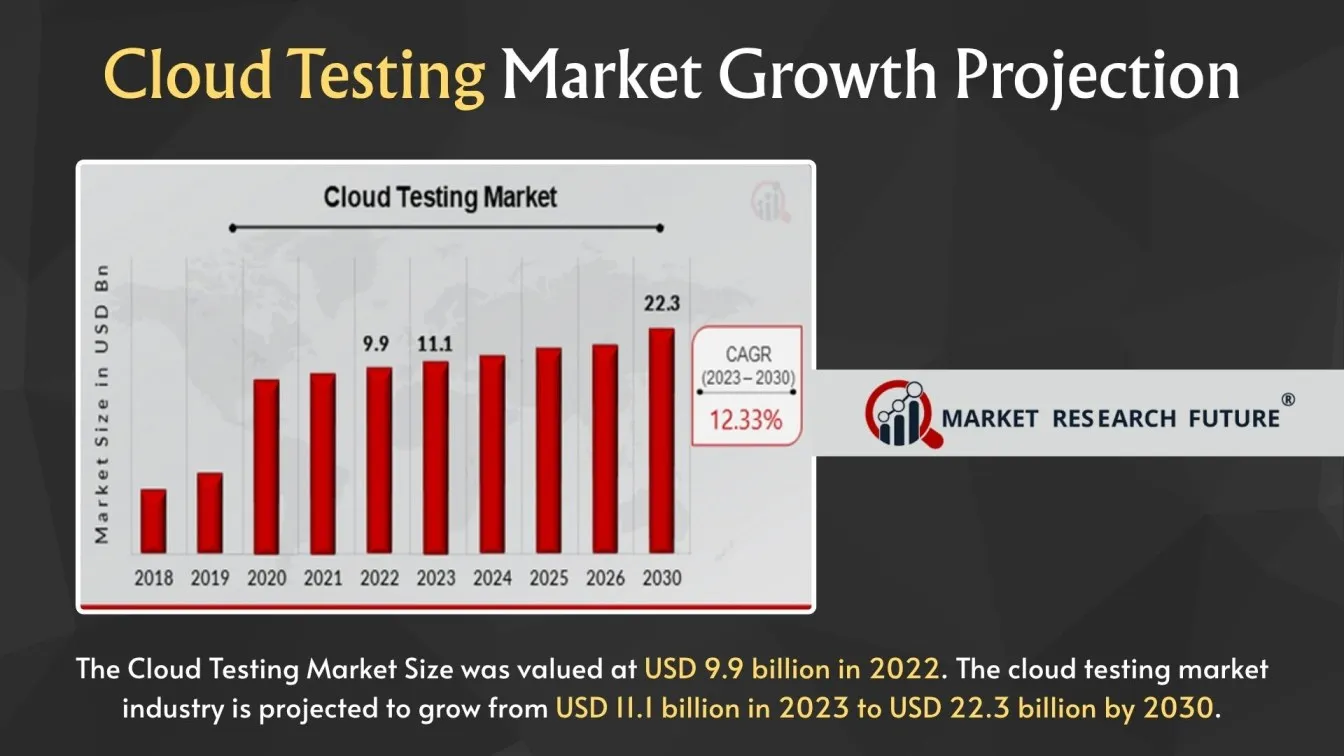
Leading cloud computing providers like AWS Cloud and Microsoft Azure Cloud offer secure, scalable environments for automated software testing services, performance testing, and more. This guide simplifies how QA teams can leverage cloud computing services, boost efficiency, ensure application security, and stay ahead with reliable cloud based testing tools.
What’s next? Keep scrolling to find out:
🚀 Cloud-Based Testing Strategy: Scalable testing with cloud technologies.
🚀 Tools & Environments: Key cloud platforms and testing tools.
🚀 Test Automation & CI/CD: Fast, efficient QA with automation.
🚀 Challenges & Solutions: Tackle security, compliance, and network issues.
🚀 Best Practices & Use Cases: Practical tips for cloud-based software testing success.
What Is Cloud‑Based Testing? Why Is It Used and Where Can It Be Applied?
Cloud-based testing is a process of validating software applications, websites, and digital platforms using cloud resources like AWS Cloud, Google Cloud, or Microsoft Azure Cloud Services. Instead of depending on physical servers, teams can perform functional, performance, security, and compatibility tests on scalable cloud platforms.
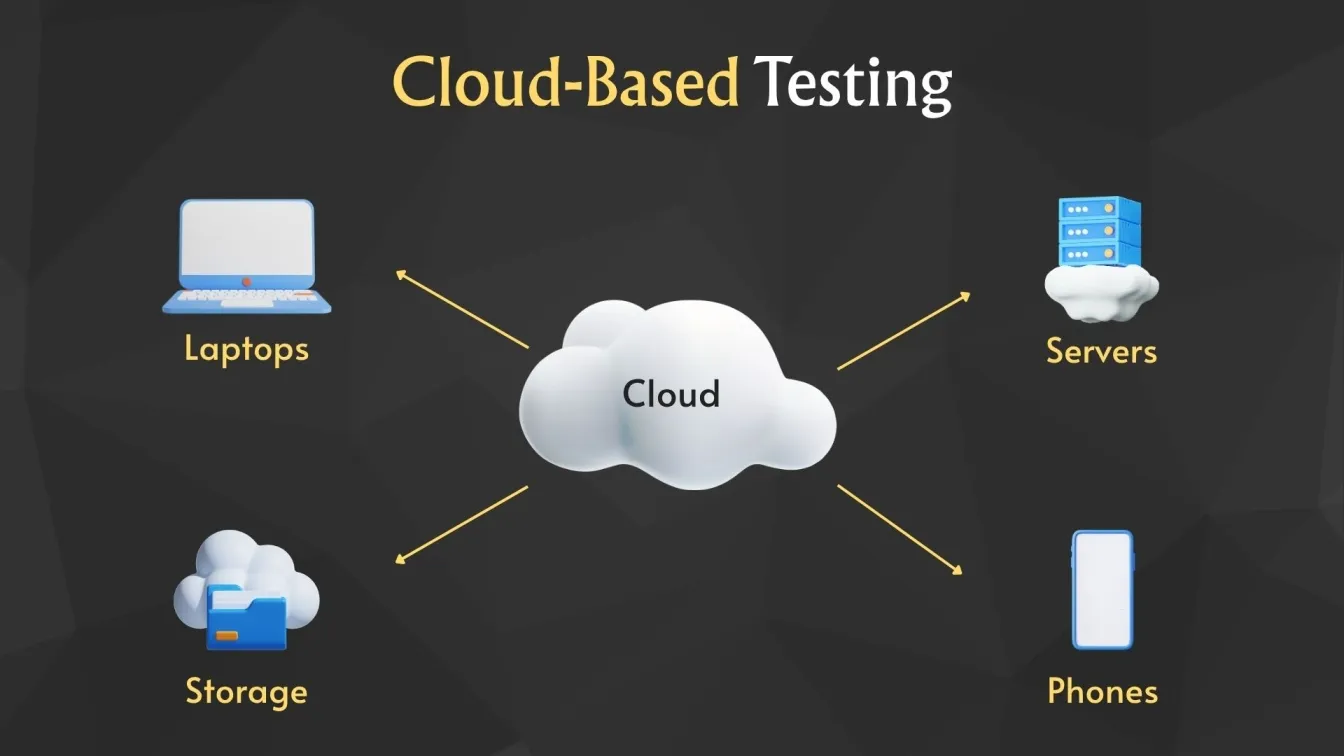
This approach is widely used for mobile app testing, API security validation, cross-browser checks, and ensuring application performance under real-world conditions. It helps QA teams speed up testing cycles, improve user experience, reduce infrastructure costs, and support global collaboration. Cloud-based testing is ideal for enterprises working with Agile methodologies and CI/CD pipelines.
Why Cloud‑Based Testing Matters for QA Teams
Cloud-based testing empowers QA teams to streamline workflows, accelerate releases, and deliver high-quality software without relying on physical infrastructure. With the rise of cloud computing services, modern teams can perform testing more efficiently while saving costs and boosting collaboration.

- Faster Environment Setup: With cloud computing platforms, teams can instantly create diverse testing environments, eliminating delays linked to manual infrastructure provisioning.
- Seamless Team Collaboration: Using automated software testing services, global QA teams can collaborate in real time, accessing shared cloud environments for continuous testing.
- On‑Demand Scalability: Thanks to cloud computing solutions, resources can be expanded or reduced based on project needs, ideal for handling performance or load testing surges.
- Cost Savings: Leading cloud computing providers offer pay‑as‑you‑go models, eliminating hefty hardware investments and reducing overall testing costs.
- Data Security Assurance: Advanced cloud computing security protocols protect sensitive data during testing, ensuring compliance with industry standards.
- Application Performance Optimization: Cloud platforms enable QA teams to run functional, compatibility, and performance tests across real-world scenarios, thereby enhancing software quality.
Cloud-Based Testing and Traditional Software Testing Comparison
The rise of cloud computing services has changed how businesses handle software quality assurance. Unlike conventional methods that rely on in-house infrastructure, cloud-based testing offers scalable, fast, and cost-efficient testing powered by cloud computing platforms. Here’s a side-by-side comparison to understand how both approaches differ:
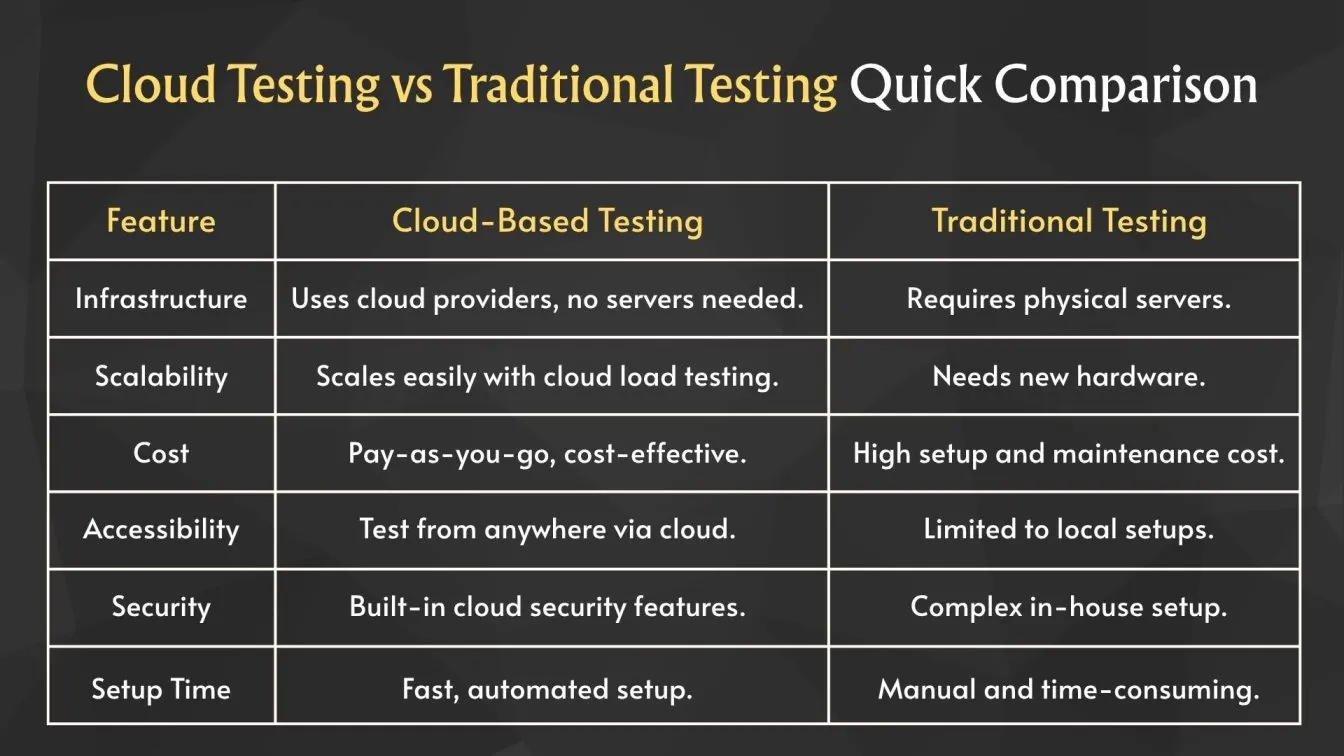
When Should You Shift to Cloud‑Based Testing
Cloud-based testing is essential when traditional infrastructure limits efficiency, scalability, or speed. Teams using AWS cloud, Microsoft Azure cloud, or Google Cloud can enhance software QA and performance testing significantly.
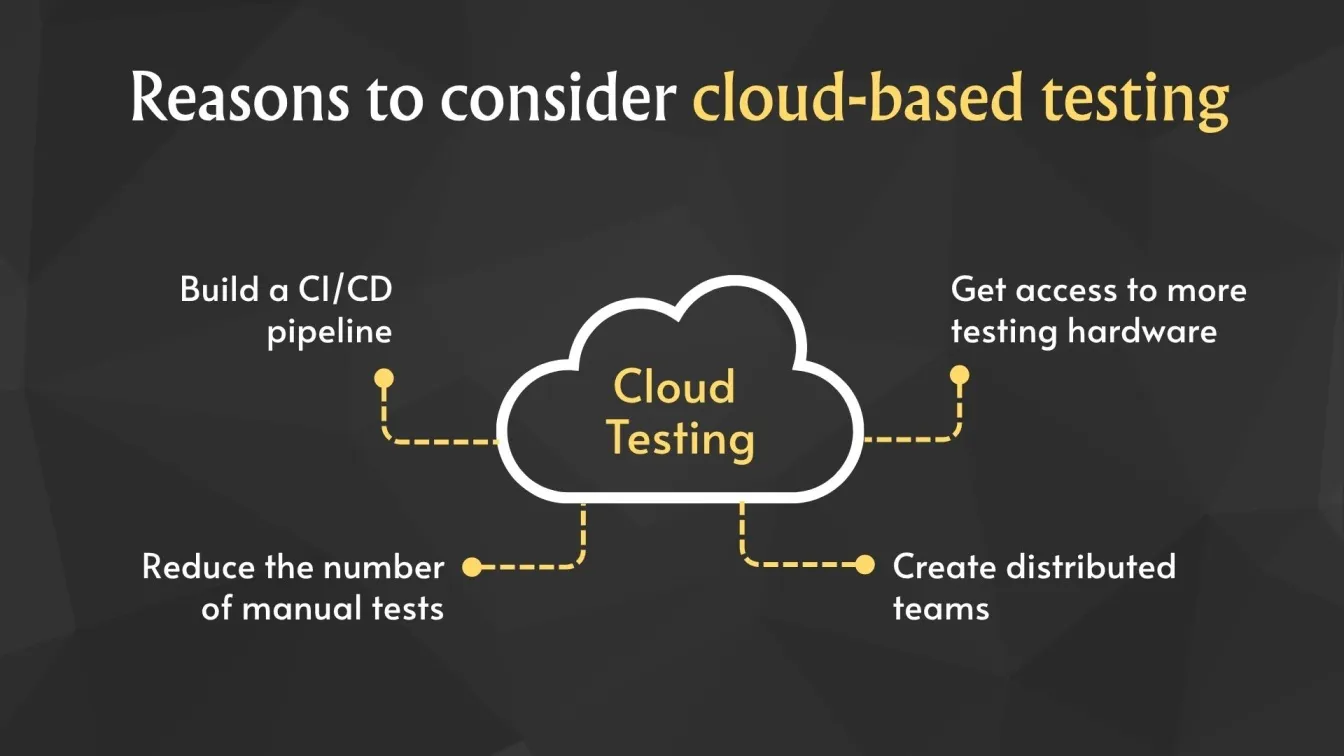
- Scalability Challenges: If testing demands outgrow in-house resources, cloud resources and cloud-based tools simplify scalability testing across devices and platforms.
- Agile and CI/CD Requirements: Agile teams use cloud-based testing to run automated tests quickly across environments. Cloud solutions like AWS and Azure enable faster feedback loops and seamless continuous deployment.
- Security and Compliance Pressures: Organizations handling sensitive data must adopt security testing for cloud-based applications to meet regulatory guidelines and ensure API security.
- Legacy System Constraints: When outdated systems hinder performance, shifting to cloud-native software helps improve compatibility testing, resilience, and fault tolerance.
Exploring Cloud‑Based Testing Environments
Cloud-based testing environments offer flexibility, faster test execution, and access to powerful cloud computing platforms. Companies leveraging AWS cloud, Microsoft Azure cloud, or Google Cloud can perform advanced testing without maintaining costly infrastructure.
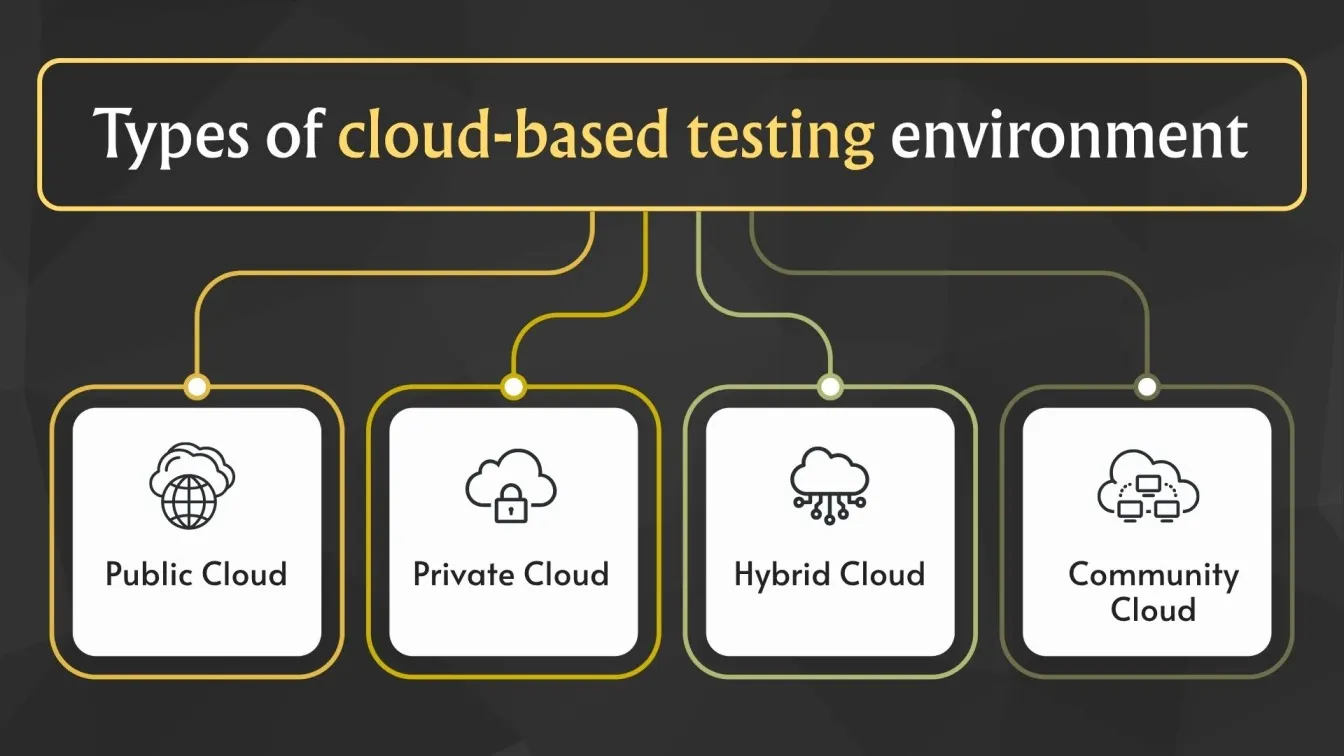
- Public Cloud Setup: Ideal for scalability testing and cost-effective test automation, using shared cloud resources across global locations. Popular with software development lifecycle teams for rapid deployments.
- Private Cloud Setup: Recommended for security testing of cloud-based applications where data protection and compliance challenges are top priorities. Ensures dedicated test environments with strict access control.
- Hybrid Cloud Setup: Combines the flexibility of public clouds with the control of private setups. Suitable for compatibility testing and software QA processes in regulated industries.
- Community Cloud Setup: Enables organizations with similar requirements to share testing infrastructure, reducing costs while maintaining a strong user experience and regulatory alignment.
Types of Cloud‑Based Testing
Cloud-based testing supports a wide range of testing approaches essential for modern software applications. Leveraging cloud computing services enables scalable, secure, and efficient validation of applications throughout the software development lifecycle.
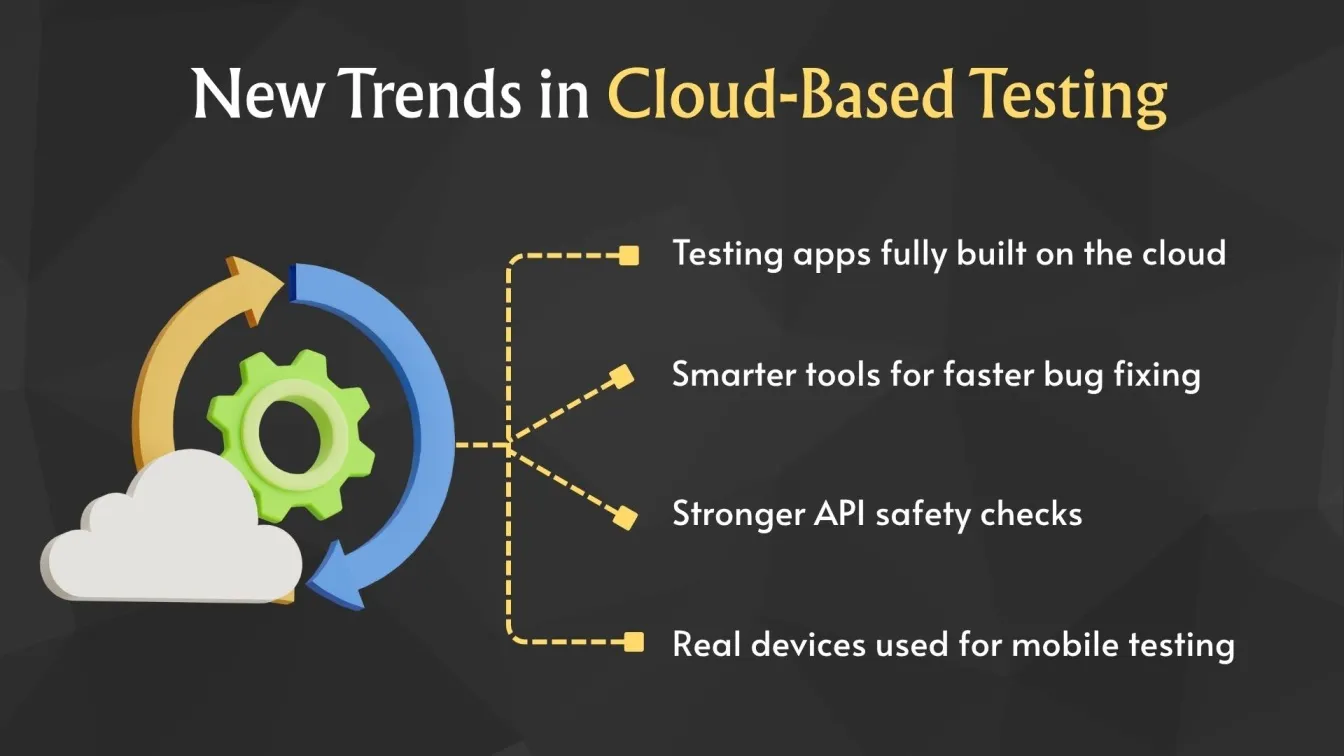
- Performance Testing: Evaluates the speed, reliability, and fault tolerance testing of cloud-native software using real-time cloud resources, ensuring a consistent user experience under various conditions.
- Security Testing: Protects cloud-based tools and cloud-based applications from vulnerabilities, focusing on API security, data privacy, and adherence to regulatory guidelines using platforms like AWS cloud or Microsoft Azure cloud.
- Scalability Testing: Assesses how cloud computing platforms handle increased workloads, ensuring your software QA process remains stable during peak traffic.
- Compatibility Testing: Validates software across multiple devices, browsers, and networks within a cloud environment, identifying edge cases and improving product accessibility.
- Regression Tests & Unit Tests: Automates test scenarios within CI/CD pipelines to maintain stability during continuous deployment cycles across different cloud environments.
Various Forms of Cloud‑Based Testing
Cloud-based testing comes in multiple forms, helping organizations improve software quality while reducing infrastructure costs. Using cloud computing solutions and automated testing, teams can validate functionality, performance, and scalability across different environments.
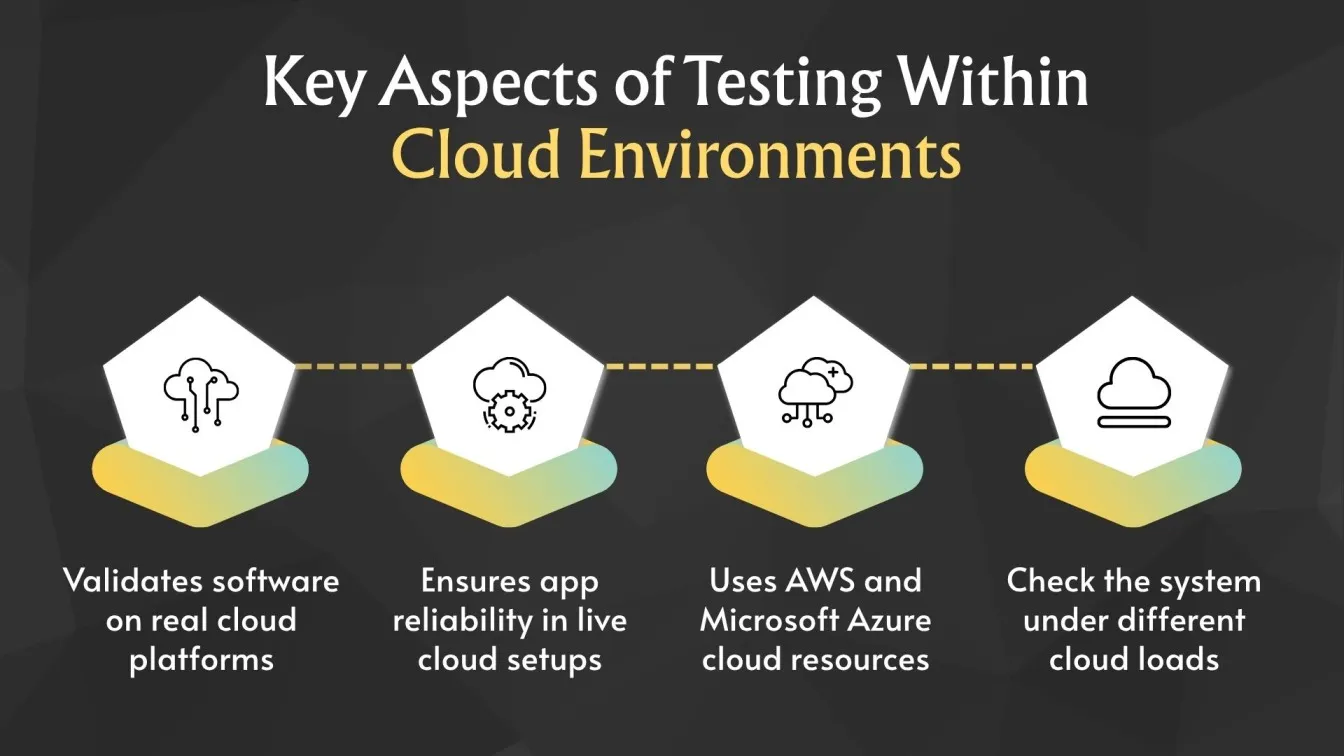
- Testing Within Cloud Environments: Focuses on evaluating software applications deployed entirely on platforms like AWS cloud or Microsoft Azure cloud computing, ensuring seamless functionality and reliability.
- Testing Across Cloud Platforms: Validates interoperability between different cloud computing providers, such as Google Cloud, helping teams overcome compatibility issues in complex ecosystems.
- Cloud-Native Testing: Specifically targets cloud-based applications designed with cloud technologies, ensuring optimized performance, API security, and scalability testing.
- Real-Device Cloud Testing: Uses cloud-based tools to test mobile applications on real devices hosted on cloud resources, enhancing user experience and compatibility coverage.
- Chaos Engineering & Fault Tolerance Testing: Simulates unexpected failures within cloud-based testing environments to strengthen system resilience and maintain service availability.
Different Cloud‑Based Testing Tools
Cloud-based tools are transforming software QA by enhancing scalability, automation, and test coverage. These tools align with cloud computing applications, supporting both automated and manual software testing services while simplifying the software development lifecycle.
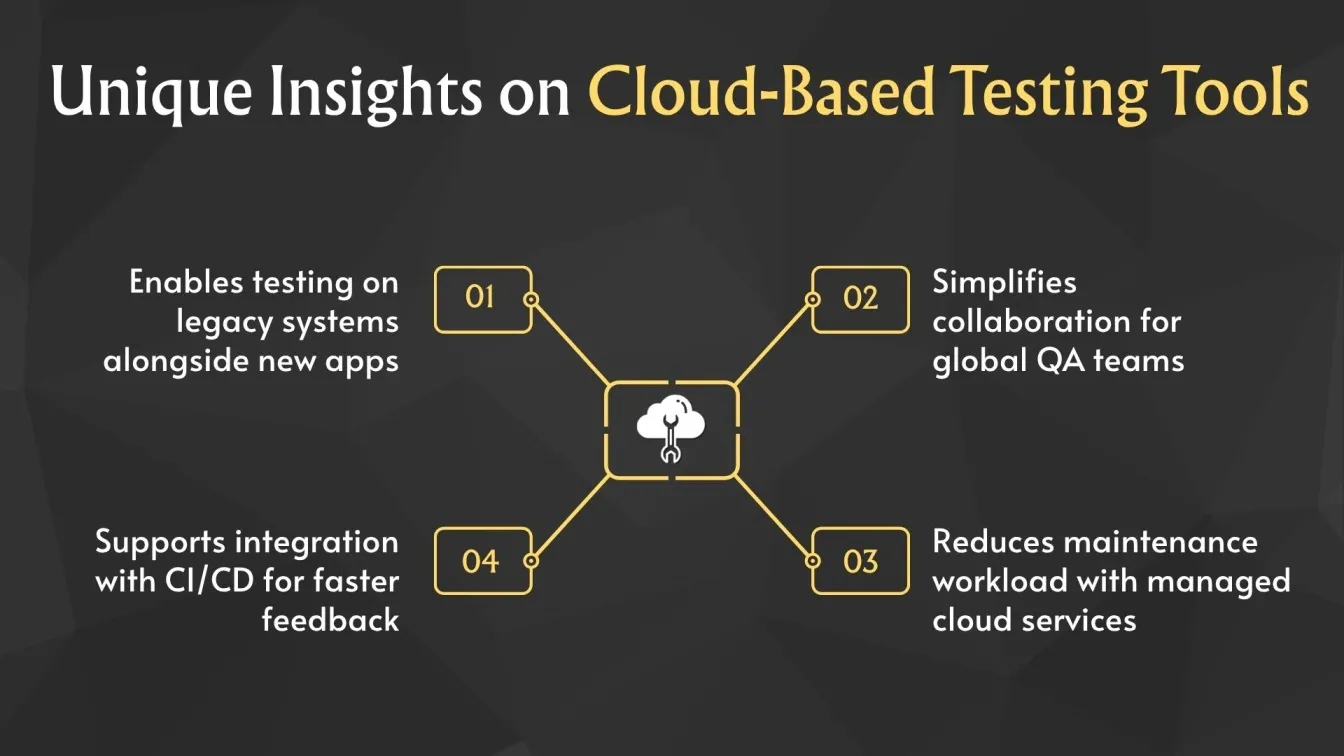
- QA Touch: A complete test management solution that integrates with other cloud-based tools, streamlining software testing consulting services for faster releases.
- Selenium Grid: Supports automated testing across browsers and platforms within cloud environments, reducing the need for manual software testing services.
- AWS Device Farm: Powered by AWS Cloud Security and AWS Cloud Storage, this tool enables testing on real devices to improve application stability.
- Sauce Labs: Enhances automated testing and ensures software performance testing services across global environments using scalable cloud resources.
- BrowserStack: Enables testing of cloud-based applications across browsers and devices, improving compatibility testing with real-world user experience.
- Apache JMeter: A vital tool for scalability testing and performance validation of cloud-native software, ideal for fault tolerance testing.
- BlazeMeter: Designed for load testing and API security checks, this tool supports continuous deployment and robust feedback loops.
- Azure DevOps Test Plans: Utilizes Microsoft Azure Cloud Migration and Microsoft Azure Cloud Security to manage exploratory and regression tests efficiently.
- LoadStorm: Optimizes cloud testing strategy by simulating high-traffic scenarios, ensuring software development lifecycle readiness.
- SOASTA CloudTest: Offers advanced monitoring tools for testing user experience and performance under peak loads across cloud-native software.
Benefits of Cloud‑Based Testing
Cloud-based testing offers exceptional advantages for businesses adopting cloud computing services and cloud computing platforms. It helps QA teams enhance efficiency, reduce costs, and deliver reliable software faster by using modern cloud computing solutions and top cloud computing providers.
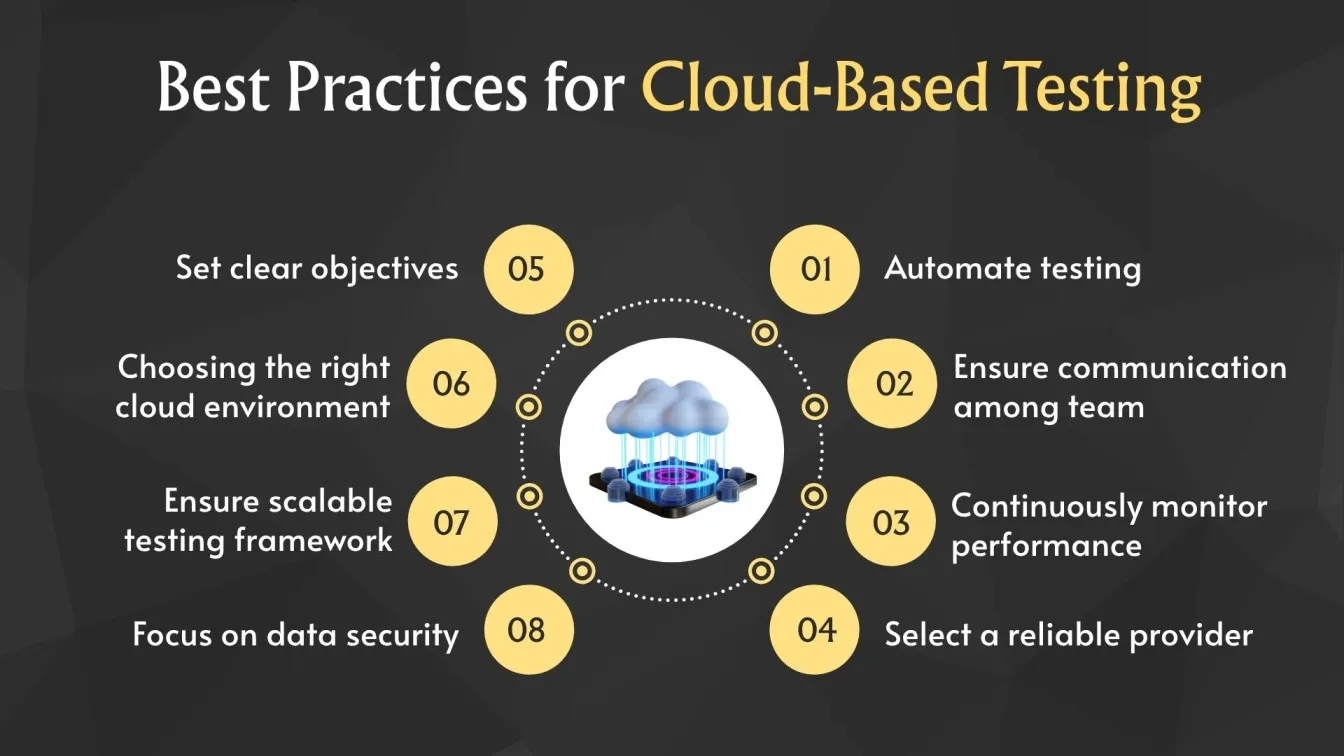
- Improved Scalability: Cloud-based mobile app testing and cloud-based load testing enable scaling test environments without additional hardware, essential for growing projects.
- Flexible Testing Environments: Cloud computing security features support safe testing of applications across various platforms while protecting sensitive data.
- Optimized Resource Usage: With cloud-based testing, businesses can reduce dependency on physical infrastructure, leveraging trusted cloud computing providers like AWS Cloud and Microsoft Azure Cloud Services.
- Faster Test Execution: Cloud-based testing tools empower teams to test faster, accelerating the software development lifecycle and enabling quicker market releases.
- Seamless Cloud Migrations: Microsoft Azure Cloud Computing and AWS Cloud Migration simplify transitioning applications while maintaining high standards of cloud computing security.
- Reliable Data Storage: AWS Cloud Storage and Azure Microsoft Cloud deliver secure, scalable storage solutions for testing data during complex projects.
- Enhanced Software Quality: QA software testing services and software performance testing services integrate with cloud-based platforms to maintain high software standards.
Challenges of Cloud‑Based Testing
While cloud-based testing offers flexibility and scalability, QA teams often face technical and operational challenges, especially when working with cloud computing applications and software testing consulting services. It's essential to understand these challenges to ensure seamless execution of cloud testing strategies.
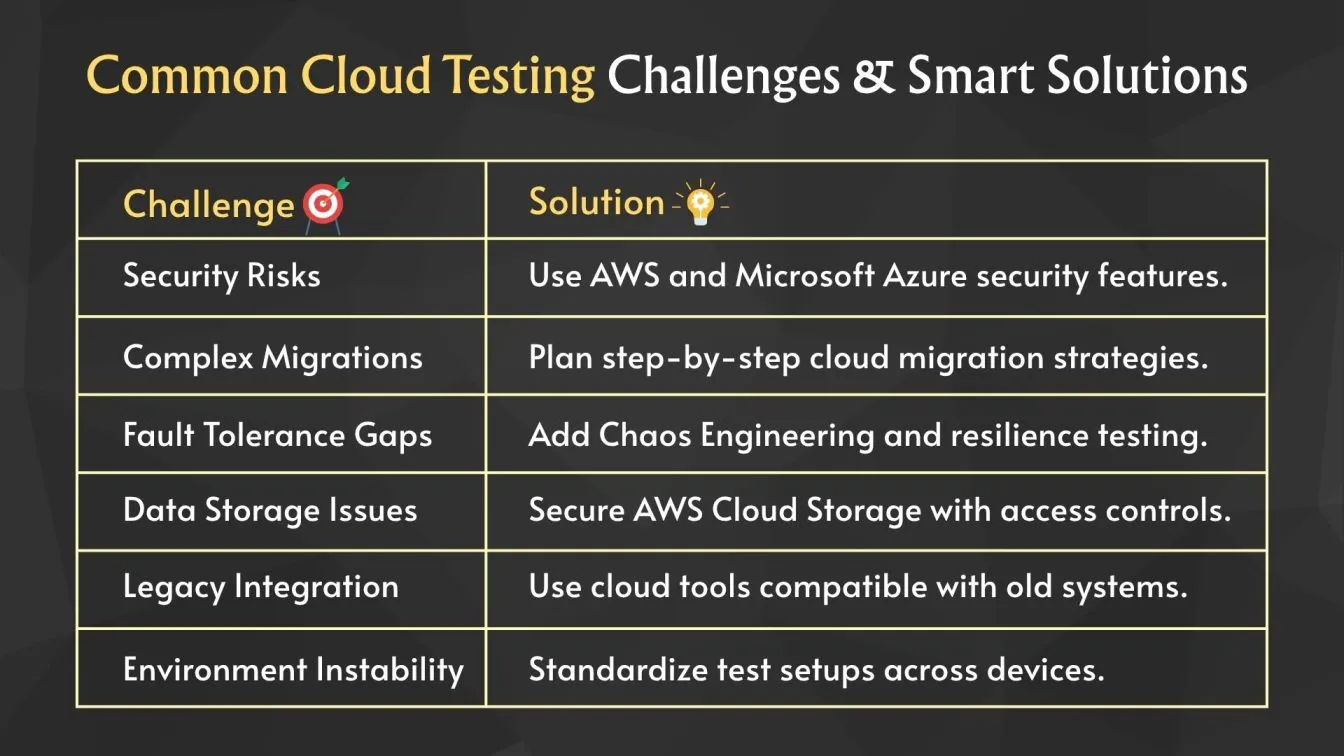
- Security Risks: Ensuring strong Microsoft Azure Cloud Security and robust AWS Cloud Security measures is crucial to prevent unauthorized access during cloud-based application testing.
- Complex Migrations: Managing large-scale Microsoft Azure Cloud Migration or AWS Cloud Migration can disrupt workflows if not planned carefully, affecting overall test timelines.
- Limited Fault Tolerance: Inadequate preparation for fault tolerance testing or unexpected failures within cloud-based applications can lead to system downtime.
- Data Storage Concerns: Securely managing testing data on platforms like AWS Cloud Storage is essential to avoid compliance risks and protect sensitive information.
- Legacy System Integration: Integrating legacy systems with modern cloud-based tools can create compatibility challenges, impacting test accuracy.
- Test Environment Instability: Configuring a consistent test environment is vital to avoid errors in performance or compatibility testing across different devices.
Proven Strategies for Cloud‑Based Testing Success
Implementing an effective cloud-based testing approach ensures better software performance, improved security, and faster releases. QA teams must align their strategies with modern cloud technologies and evolving software testing services to stay competitive.
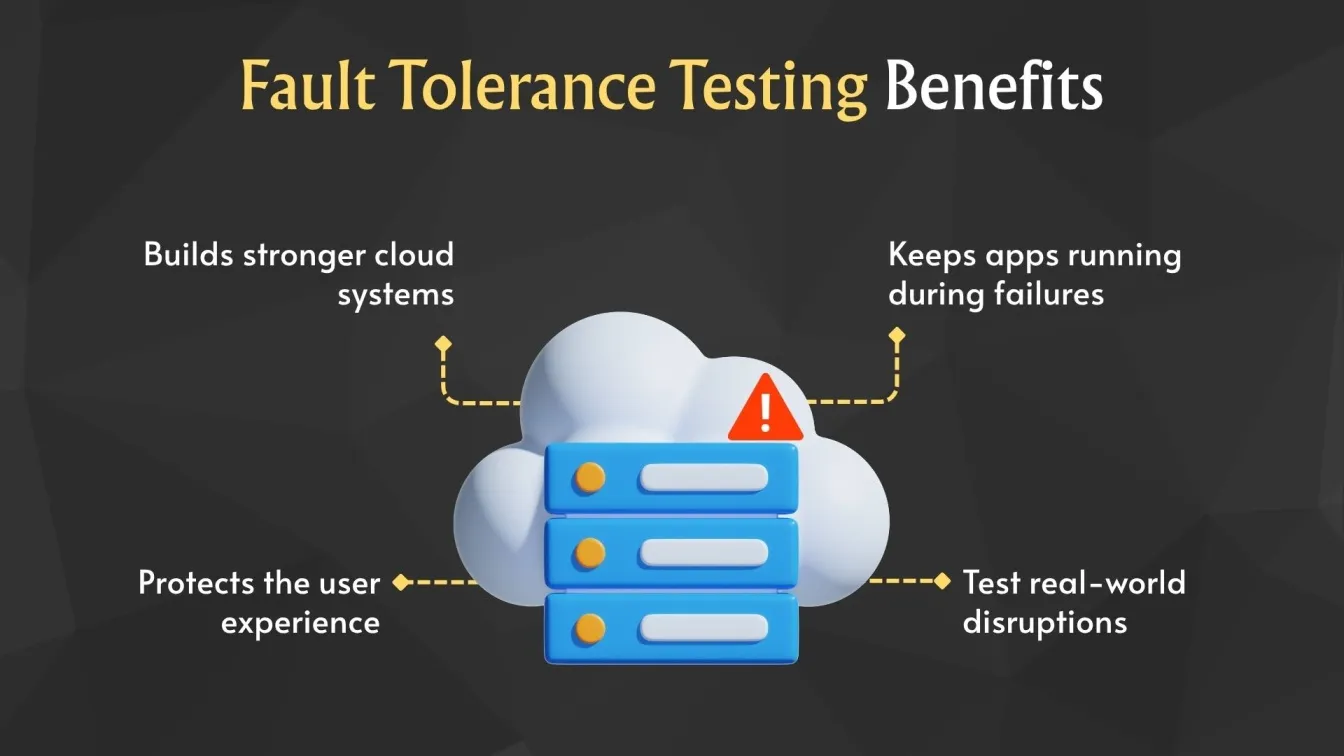
- Leverage Scalability Testing: Plan robust scalability testing to ensure your applications perform consistently during peak loads, especially in complex cloud-native software environments.
- Optimize Cloud Resource Usage: Manage cloud resources effectively to control testing costs and improve performance throughout the software development lifecycle.
- Strengthen Security Testing: Prioritize API security and regression tests to safeguard your systems against vulnerabilities in cloud-based applications.
- Integrate Cloud Platforms: Tools like AWS Cloud Computing simplify infrastructure management, ensuring reliable test environments for faster deployments.
- Implement Continuous Feedback Loops: Establish real-time feedback loops with monitoring tools to detect issues early and support continuous improvement.
- Test for Fault Tolerance: Incorporate Chaos Engineering and fault tolerance testing practices to validate your system’s resilience under failure scenarios.
Real‑World Use Cases of Cloud‑Based Testing
Adopting cloud-based testing enhances speed, reliability, and efficiency in delivering high-quality cloud-based applications. QA teams can overcome challenges by combining the right tools, security practices, and efficient resource management with modern cloud computing services.
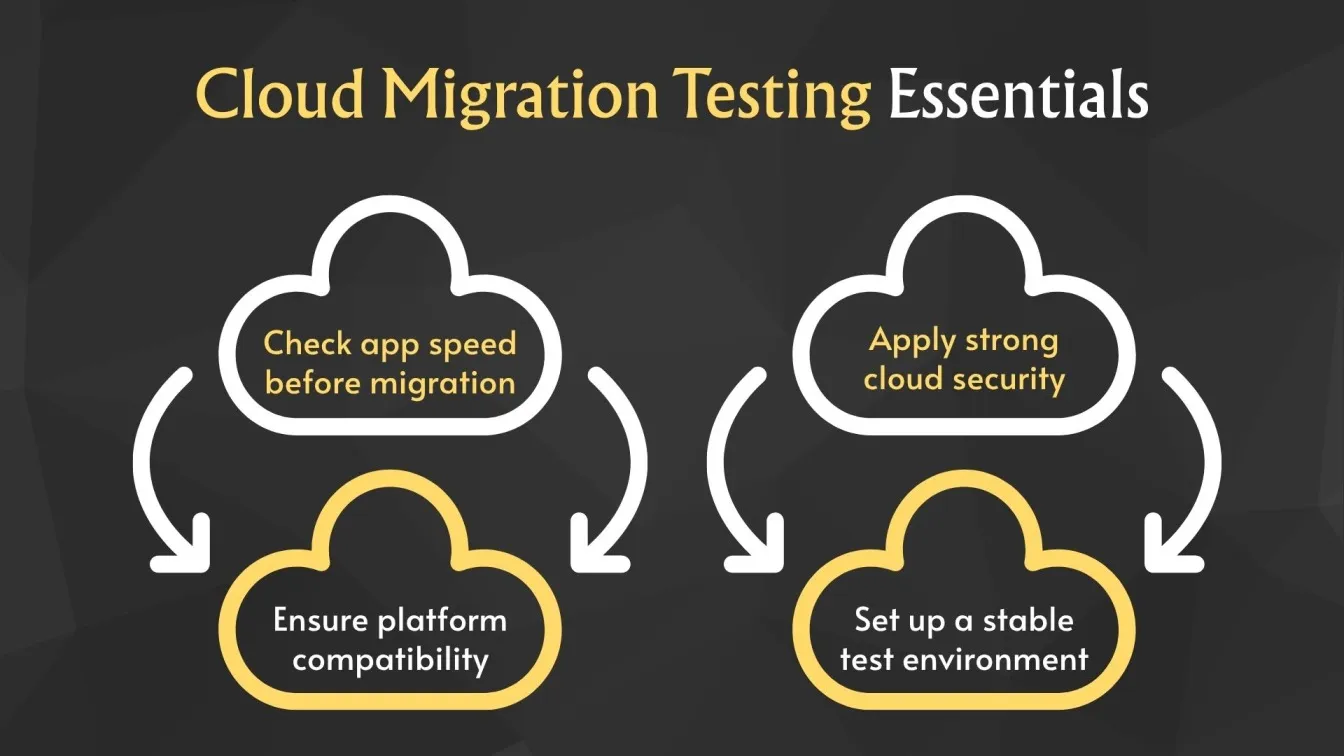
- Cross-Device Application Testing: QA teams use platforms like AWS Device Farm to validate mobile and web applications across thousands of real devices, ensuring a consistent user experience globally.
- Global Performance Testing: Cloud-based load testing simulates high-traffic scenarios from different regions, helping businesses measure performance under peak loads.
- Cloud Migration Validation: During Microsoft Azure Cloud Migration or AWS Cloud Migration, automated testing ensures legacy systems run smoothly in the new environment without compatibility issues.
- API Security Testing: Enterprises conduct cloud-native API security checks within cloud environments to safeguard integrations and maintain data privacy.
- Disaster Recovery & Fault Tolerance Testing: Chaos engineering and fault tolerance testing in cloud-based environments ensure critical applications stay operational during failures.
- Scalability Readiness for Rapid Growth: Cloud scalability testing prepares software to handle sudden user spikes, avoiding downtime during product launches or promotions.
Final Thoughts
Cloud-based testing empowers QA teams to deliver reliable, secure, and scalable software faster. By combining cloud computing solutions, automated software testing services, and modern tools like AWS cloud computing and Microsoft Azure cloud migration, businesses can streamline testing and improve product quality. Whether it's performance, security, or compatibility, adopting the right cloud-based testing strategy ensures your software stays competitive and ready for evolving market demands.

Cloud-based testing accelerates quality assurance by enabling faster, scalable, and secure software delivery. With advanced cloud-based test automation services and continuous testing, businesses can efficiently meet the demands of modern development. Top software testing companies, including frugal testing, offer specialized services like functional testing solutions, selenium automation testing service, and load testing service. Partnering with trusted providers ensures your QA strategy is future-ready, cost-effective, and aligned with evolving software quality standards.
People Also Ask
1. What is the role of virtualization in cloud-based testing?
Virtualization helps create scalable, isolated test environments without hardware limits. It enhances test efficiency for software QA teams.
2. How reliable is data privacy in cloud-based testing environments?
Data privacy is protected through encryption, access control, and compliance standards. Trusted providers follow strict security protocols.
3. How do cloud-based testing platforms handle sudden traffic spikes?
These platforms auto-scale cloud resources to manage high traffic smoothly. It prevents downtime and ensures reliable performance.
4. What payment models are available for cloud-based testing services?
Options include pay-as-you-go, subscription, and usage-based billing plans. Teams pay only for the resources they use.
5. Can cloud-based testing support cross-browser and cross-device testing?
Yes, cloud testing platforms enable broad testing across devices and browsers. It ensures a seamless user experience everywhere.



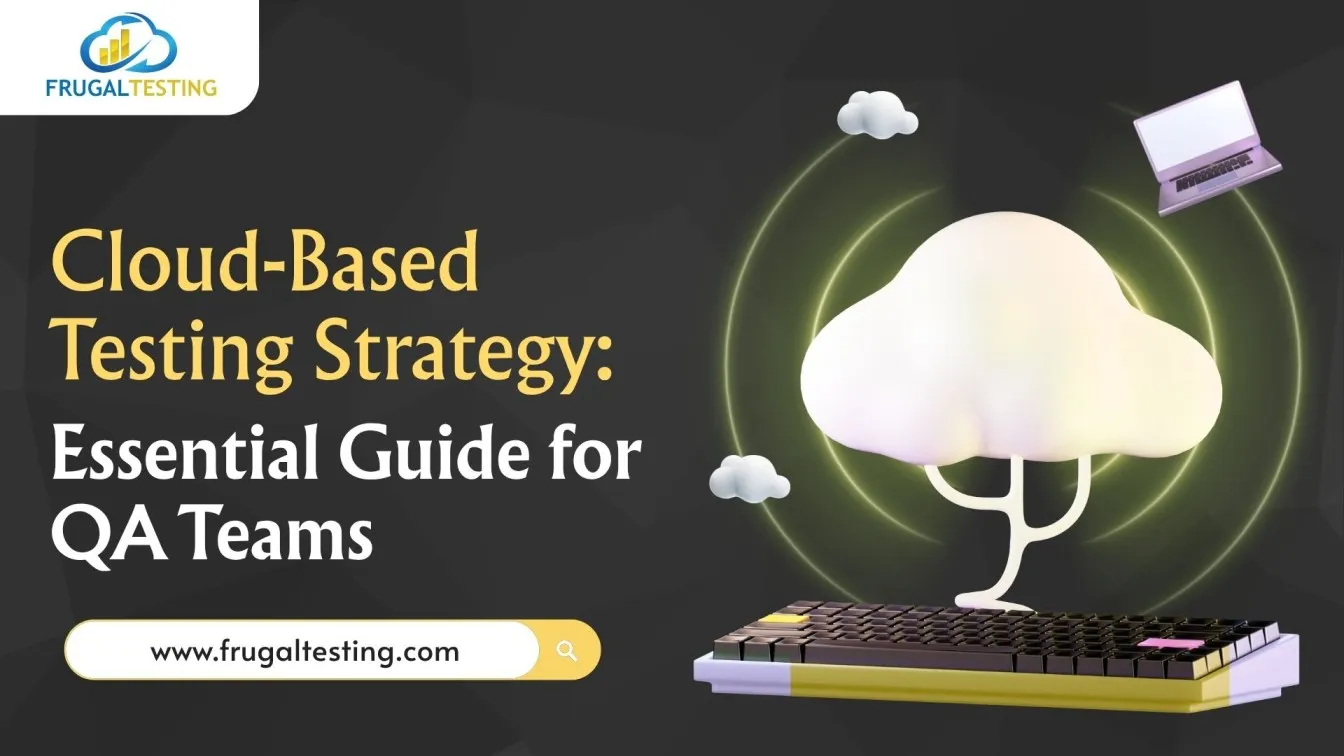

%201.webp)

